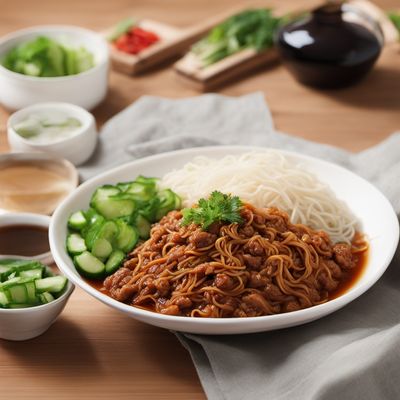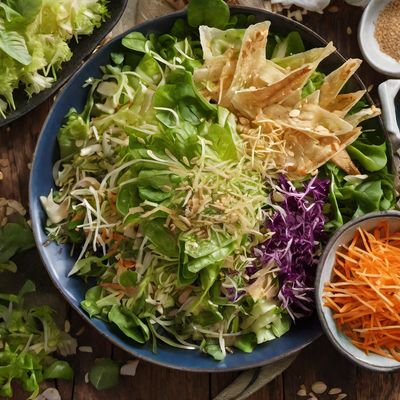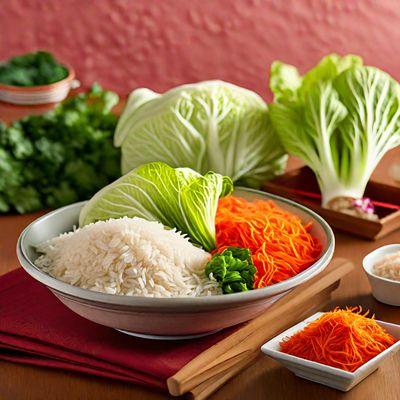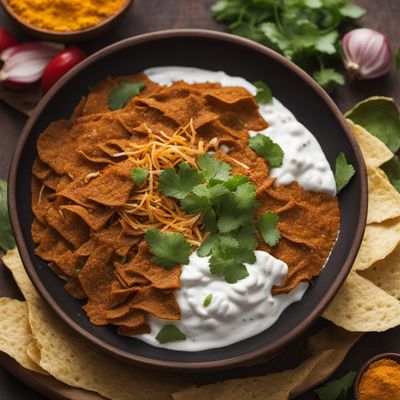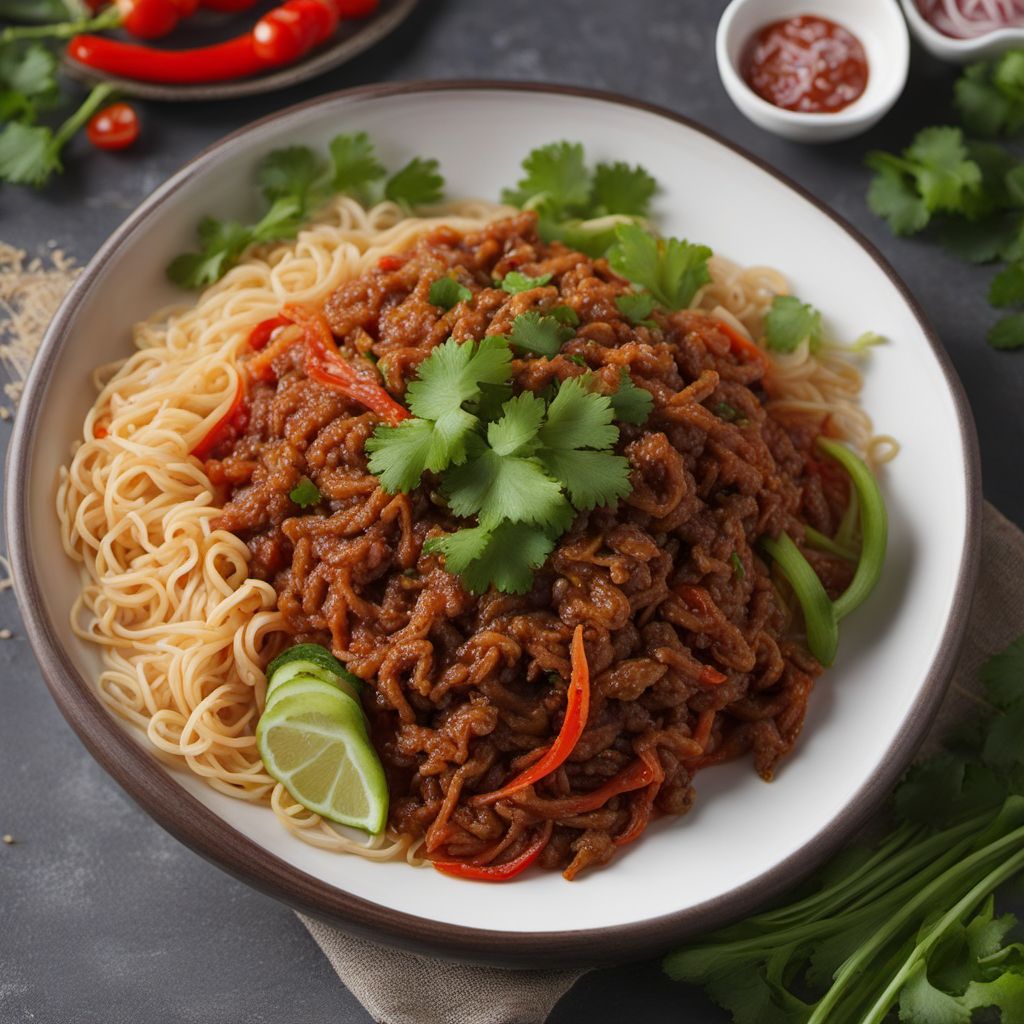
Recipe
Kodava-style Zhajiangmian
Spicy Noodle Delight: Kodava-style Zhajiangmian
4.7 out of 5
Indulge in the flavors of Kodava cuisine with this unique twist on the classic Chinese dish, Zhajiangmian. Kodava-style Zhajiangmian combines the rich and spicy flavors of Kodava cuisine with the comforting goodness of noodles.
Metadata
Preparation time
20 minutes
Cooking time
25 minutes
Total time
45 minutes
Yields
4 servings
Preparation difficulty
Medium
Suitable for
Non-vegetarian, Dairy-free, Nut-free, Gluten-free (if using gluten-free noodles), Low-carb (if using zucchini noodles instead of wheat noodles)
Allergens
Pork
Not suitable for
Vegetarian, Vegan, Paleo, Keto, Halal
Ingredients
In this Kodava adaptation of Zhajiangmian, we replace the traditional Chinese ingredients like soybean paste and fermented soybean paste with Kodava spices and flavors. The sauce is made with minced pork, onions, garlic, and a blend of Kodava spices, giving it a distinct taste. Additionally, we serve the dish with pickled vegetables on the side, which adds a tangy element to complement the spicy flavors. We alse have the original recipe for Zhajiangmian, so you can check it out.
-
250g (8.8 oz) thick wheat noodles 250g (8.8 oz) thick wheat noodles
-
300g (10.6 oz) minced pork 300g (10.6 oz) minced pork
-
1 large onion, finely chopped 1 large onion, finely chopped
-
4 cloves of garlic, minced 4 cloves of garlic, minced
-
2 tablespoons Kodava spice blend (made with coriander, cumin, black pepper, and red chili powder) 2 tablespoons Kodava spice blend (made with coriander, cumin, black pepper, and red chili powder)
-
2 tablespoons vegetable oil 2 tablespoons vegetable oil
-
2 tablespoons tomato paste 2 tablespoons tomato paste
-
1 tablespoon soy sauce 1 tablespoon soy sauce
-
1 tablespoon vinegar 1 tablespoon vinegar
-
Salt to taste Salt to taste
-
Fresh cilantro, chopped (for garnish) Fresh cilantro, chopped (for garnish)
-
Pickled vegetables (for serving) Pickled vegetables (for serving)
Nutrition
- Calories (kcal / KJ): 450 kcal / 1884 KJ
- Fat (total, saturated): 20g, 6g
- Carbohydrates (total, sugars): 40g, 4g
- Protein: 25g
- Fiber: 4g
- Salt: 2g
Preparation
-
1.Cook the thick wheat noodles according to the package instructions. Drain and set aside.
-
2.Heat vegetable oil in a large pan over medium heat. Add the minced pork and cook until browned.
-
3.Add the chopped onion and minced garlic to the pan. Sauté until the onion becomes translucent.
-
4.Stir in the Kodava spice blend, tomato paste, soy sauce, vinegar, and salt. Cook for a few minutes until the flavors meld together.
-
5.Add a splash of water if the sauce becomes too thick. Simmer for another 5 minutes.
-
6.Divide the cooked noodles into serving bowls. Top with the Kodava-style sauce.
-
7.Garnish with fresh cilantro and serve with pickled vegetables on the side.
Treat your ingredients with care...
- Pork — Make sure to use lean minced pork for a healthier option. You can also substitute it with minced chicken or turkey if desired.
Tips & Tricks
- For a spicier version, add a dash of Kodava chili powder or fresh green chilies.
- Adjust the thickness of the sauce by adding more water if desired.
- Customize the toppings by adding sliced green onions, chopped peanuts, or fried shallots for extra flavor and texture.
- If you prefer a vegetarian version, replace the minced pork with crumbled tofu or cooked lentils.
Serving advice
Serve Kodava-style Zhajiangmian hot, allowing the flavors to meld together. Garnish with fresh cilantro for a pop of freshness. Accompany the dish with pickled vegetables to balance the spiciness.
Presentation advice
Present the Kodava-style Zhajiangmian in individual bowls, with the noodles as the base and the savory sauce generously spooned on top. Sprinkle fresh cilantro over the sauce for an appealing touch. Serve with a side of vibrant pickled vegetables to enhance the visual appeal.
More recipes...
For Zhajiangmian
For Chinese cuisine » Browse all
More Chinese cuisine dishes » Browse all

Luosifen
Snail Rice Noodles
Luosifen is a spicy noodle soup that is popular in the Guangxi province of China. It is made with rice noodles that are served in a flavorful...

Beef & Broccoli
Beef and broccoli is a classic Chinese-American dish that is made with tender beef, crisp broccoli, and a savory sauce. It is a flavorful and...
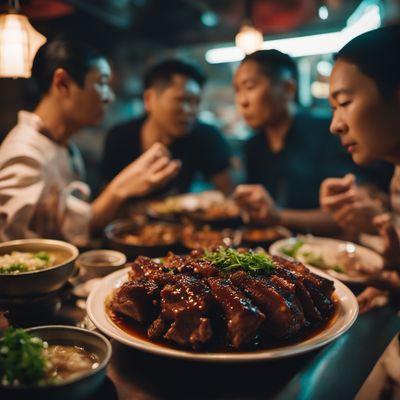
Pai gwut
Steamed Pork Ribs
Pai gwut is a Chinese dish that is made by steaming pork spare ribs with black bean sauce. It is a popular dish that is often served as a main...
